|
|
|
Sort Order |
|
|
|
Items / Page
|
|
|
|
|
|
|
| Srl | Item |
| 1 |
ID:
086438
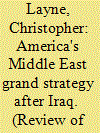

|
|
|
|
|
| Publication |
2009.
|
| Summary/Abstract |
In this paper, I argue that there is an emerging consensus among realists that the US should abandon its hegemonic strategy and adopt an offshore balancing strategy. Here, Iraq and the so called war on terrorism (or 'long war', or 'global counter-insurgency', as some American officials sometimes refer to it) have been the catalysts. Increasingly, it is recognised that US aims in the Persian Gulf/Middle East - and the American military presence in the region - have fuelled terrorism, and caused Iran to self-defensively seek to acquire a nuclear weapons capability. A number of leading realists now argue that the best strategy for the US is to extricate itself from Iraq, reduce its regional footprint, and adopt an offshore balancing strategy.
|
|
|
|
|
|
|
|
|
|
|
|
|
|
|
|
| 2 |
ID:
086440
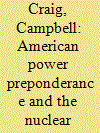

|
|
|
|
|
| Publication |
2009.
|
| Summary/Abstract |
The theory of Power Preponderance put forward by Stephen Brooks and William Wohlforth is poised to replace structural balance-of-power theory as the leading American Realist interpretation of international politics. Power Preponderance argues that would-be rivals to the US are not balancing against it because they are dissuaded from doing so by geopolitical and structural factors, rather than because they love the US or are cowed by it. This article shows why the central analytical claim of Power Preponderance would be substantially enhanced by incorporating the logic of the nuclear revolution, but that its main policy recommendation - indefinite and magnanimous American preponderance - is undermined by the spectre of nuclear war. In the nuclear age, normative solutions to the problem of anarchy invariably gravitate toward the logic of a world state.
|
|
|
|
|
|
|
|
|
|
|
|
|
|
|
|
| 3 |
ID:
086455
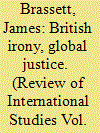

|
|
|
|
|
| Publication |
2009.
|
| Summary/Abstract |
The article provides a critical analysis of the concept of irony and how it relates to global justice. Taking Richard Rorty as a lead, it is suggested that irony can foreground a sense of doubt over our own most heartfelt beliefs regarding justice. This provides at least one ideal sense in which irony can impact the discussion of global ethics by pitching less as a discourse of grand universals and more as a set of hopeful narratives about how to reduce suffering. The article then extends this notion via the particular - and particularly - ethnocentric case of British Irony. Accepting certain difficulties with any definition of British Irony the article reads the interventions of three protagonists on the subject of global justice - Chris Brown, Banksy and Ricky Gervais. It is argued that their considerations bring to light important nuances in irony relating to the importance of playfulness, tragedy, pain, self-criticism and paradox. The position is then qualified against the (opposing) critiques that irony is either too radical, or, too conservative a quality to make a meaningful impact on the discussion of global justice. Ultimately, irony is defended as a critical and imaginative form, which can (but does not necessarily) foster a greater awareness of the possibilities and limits for thinking/doing global justice.
%''The comic frame, in making a man the student of himself, makes it possible for him to 'transcend' occasions when he has been tricked or cheated, since he can readily put such discouragements into his 'assets' column, under the heading of 'experience'. . . . In sum, the comic frame should enable people to be observers of themselves, while acting.
|
|
|
|
|
|
|
|
|
|
|
|
|
|
|
|
| 4 |
ID:
086447
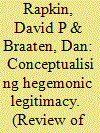

|
|
|
|
|
| Publication |
2009.
|
| Summary/Abstract |
What is international legitimacy and whence does it stem? What entities seek it and why, and who grants or withholds it? How might the different meanings of the concept be reconciled? This article argues that Family Resemblance Concept (FRC) methods are particularly well-suited to explicating the complex meanings associated with this multidimensional concept. We start with a basic level definition based on subjective perceptions and beliefs, the normative quality of oughtness, and the idea of consent. We then expand this definition by developing several secondary-level dimensions: shared values, constitutionalism (consisting of two forms of process legitimacy), and outcome legitimacy. At the indicator level, we examine 14 different survey questions asked in international public opinion polls to provide a tentative empirical glimpse of how our FRC version of legitimacy could be operationalised and tested. The paper concludes with a discussion of the usefulness of the FRC scheme in imposing some order on the legitimacy concept and in illuminating the recent legitimacy problems afflicting the United States.
|
|
|
|
|
|
|
|
|
|
|
|
|
|
|
|
| 5 |
ID:
086443
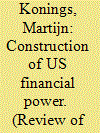

|
|
|
|
|
| Publication |
2009.
|
| Summary/Abstract |
Critical work in international political economy (IPE) has sought to theorise US financial power through the concept of structural power, intended as a means to go beyond state-centric conceptions of political power and to trace the state's interaction with socio-economic forces. But due to the tendency to ontologise the distinction between state and market, IPE has not been fully successful in articulating the linkages between structural power and state power. The article then examines literature in the field of cultural political economy (CPE), which emphasises the constitutive importance of the cultural norms and practices situated at the level of everyday life. The CPE literature fails to challenge established IPE accounts in some key respects, and the article relates this to its conception of political power. The article develops an institution-based perspective that is more suitable to theorising the linkages between structural power and state power, and then proceeds to develop an interpretation of the construction of American financial power over the course of the 20th century. It reinterprets some of the key moments in the history of US and global finance and re-examines notions of American financial decline.
|
|
|
|
|
|
|
|
|
|
|
|
|
|
|
|
| 6 |
ID:
086453
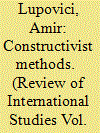

|
|
|
|
|
| Publication |
2009.
|
| Summary/Abstract |
My aim in this article is to improve the methodology of the modernist constructivist approach and to provide a more coherent, rigid, and systematic constructivist framework for research. I do this by combining the methods of process tracing, discourse analysis, and counterfactuals. In addition, I aim to provide clearer methodological criteria for the evaluation of constructivist research by modifying some of the positivist criteria and adding the criterion of contextual validity. I assert that a more coherent methodology will strengthen and improve constructivist study and may contribute to better communication between constructivist and positivist scholars.
|
|
|
|
|
|
|
|
|
|
|
|
|
|
|
|
| 7 |
ID:
086451
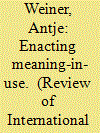

|
|
|
|
|
| Publication |
2009.
|
| Summary/Abstract |
This article proposes a framework for empirical research on contested meaning of norms in international politics. The goal is to identify a design for empirical research to examine associative connotations of norms that come to the fore when norms are contested in situations of governance beyond-the-state and especially in crises. If cultural practices shape experience and expectations, they need to be identified and made 'account-able' based on empirical research. To that end, the proposed qualitative approach centres on individually enacted meaning-in-use. The framework comprises norm-types, conditions of contestation, types of divergence and opposition-deriving as a specific interview evaluation technique. Section one situates the problem of contestation in the field of constructivist research on norms. Section two introduces distinctive conditions of contestation and types of norms. Section three details the methodology of conducting and evaluating interviews and presents the technique of opposition-deriving with a view to reconstructing the structure of meaning-in-use. Section four concludes with an outlook to follow-up research.
|
|
|
|
|
|
|
|
|
|
|
|
|
|
|
|
| 8 |
ID:
086444
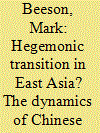

|
|
|
|
|
| Publication |
2009.
|
| Summary/Abstract |
The 'rise of China' is seen by some observers as a precursor of inevitable hegemonic competition in East Asia. At the very least, it seems likely that China's influence in East Asia will grow at the expense of the United States. Whether this will eventually amount to a form of 'hegemonic transition' is far less clear. It is, therefore, an opportune moment to consider the relative strengths and weaknesses of China and the US in East Asia. This paper suggests that the nature of hegemonic competition and transition is more uncertain and complex than some of the most influential theoretical understandings of hegemony would have us believe.
|
|
|
|
|
|
|
|
|
|
|
|
|
|
|
|
| 9 |
ID:
086449
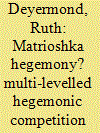

|
|
|
|
|
| Publication |
2009.
|
| Summary/Abstract |
A multi-levelled hegemonic encounter has developed in Central Asia, in which a global hegemon, the USA; a regional hegemon, the Russian Federation; an aspirant sub-regional hegemon, Uzbekistan; and an emergent regional and global hegemon, China, co-exist within the framework of Central Asian security politics. Where these hegemons' interests do not conflict this can be characterised as a matrioshka model of hegemony: the different level hegemons can accommodate one another peacefully and where their interests coincide they can form alliances. The model of multi-levelled hegemony developed here highlights the simultaneous presence of competition and cooperation. This article explores the way in which the various bilateral hegemonic relations in the region also indicate that actual and emergent hegemonic states at different levels can cooperate as hegemons in order to challenge, or to respond to challenge, by hegemonic states at other levels. This helps to clarify the question of whether the increasingly competitive interaction between these states is likely to lead to conflict.
|
|
|
|
|
|
|
|
|
|
|
|
|
|
|
|
| 10 |
ID:
086442


|
|
|
|
|
| Publication |
2009.
|
| Summary/Abstract |
A growing number of scholars, commentators, and pundits describe the contemporary US as an empire. This article argues that these authors have not paid sufficient attention to the historiography of empire and imperialism. Indeed, the historiography of the British and American empires offers important lessons for current debates including what is the appropriate definition of the American empire, what are the social and political foundations of the American Empire, and what are the consequences of the American Empire for the US and the wider world.
|
|
|
|
|
|
|
|
|
|
|
|
|
|
|
|
|
|
|
|
|